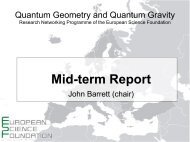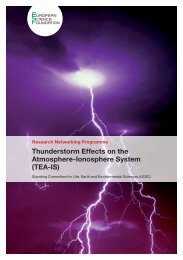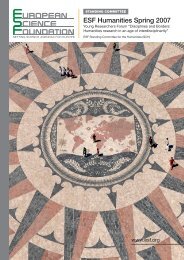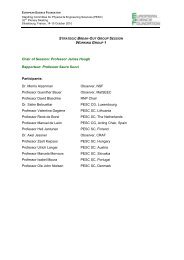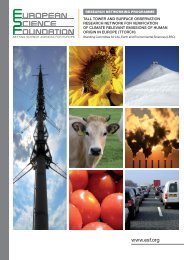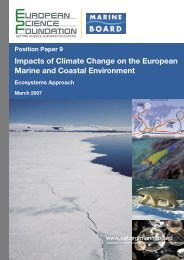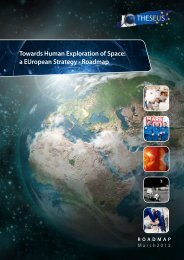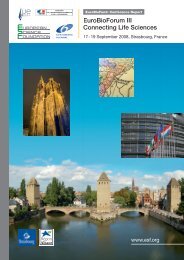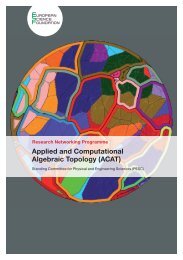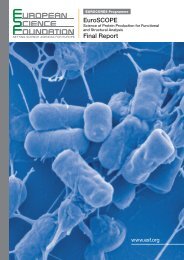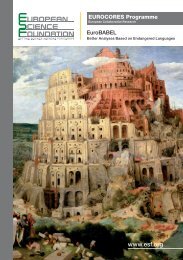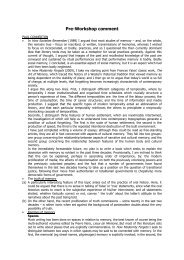1.3 Misconduct1.4 Good <strong>Research</strong> Practices6<strong>The</strong> <strong>European</strong> <strong>Code</strong> <strong>of</strong> <strong>Conduct</strong> <strong>for</strong> <strong>Research</strong> <strong>Integrity</strong><strong>Research</strong> misconduct is harmful <strong>for</strong> knowledge. Itcould mislead other researchers, it may threatenindividuals or society – <strong>for</strong> instance if it becomesthe basis <strong>for</strong> unsafe drugs or unwise legislation –and, by subverting the public’s trust, it could leadto a disregard <strong>for</strong> or undesirable restrictions beingimposed on research.<strong>Research</strong> misconduct can appear in many guises:• Fabrication involves making up results and recordingthem as if they were real;• Falsification involves manipulating research processesor changing or omitting data;• Plagiarism is the appropriation <strong>of</strong> other people’smaterial without giving proper credit;• Other <strong>for</strong>ms <strong>of</strong> misconduct include failure to meetclear ethical and legal requirements such as misrepresentation<strong>of</strong> interests, breach <strong>of</strong> confidentiality,lack <strong>of</strong> in<strong>for</strong>med consent and abuse <strong>of</strong> researchsubjects or materials. Misconduct also includesimproper dealing with infringements, such asattempts to cover up misconduct and reprisals onwhistleblowers;• Minor misdemeanours may not lead to <strong>for</strong>malinvestigations, but are just as damaging given theirprobable frequency, and should be corrected byteachers and mentors.<strong>The</strong> response must be proportionate to the seriousness<strong>of</strong> the misconduct: as a rule it must bedemonstrated that the misconduct was committedintentionally, knowingly or recklessly. Pro<strong>of</strong>must be based on the preponderance <strong>of</strong> evidence.<strong>Research</strong> misconduct should not include honesterrors or differences <strong>of</strong> opinion. Misbehaviour suchas intimidation <strong>of</strong> students, misuse <strong>of</strong> funds andother behaviour that is already subject to universallegal and social penalties is unacceptable as well, butis not ‘research misconduct’ since it does not affectthe integrity <strong>of</strong> the research record itself.<strong>The</strong>re are other failures to adhere to good practices– incorrect procedures, faulty data management, etc.– that may affect the public’s trust in science <strong>The</strong>seshould be taken seriously by the research communityas well. Accordingly, data practices shouldpreserve original data and make it accessible to colleagues.Deviations from research procedures includeinsufficient care <strong>for</strong> human subjects, animals or culturalobjects; violation <strong>of</strong> protocols; failure to obtainin<strong>for</strong>med consent; breach <strong>of</strong> confidentiality, etc.It is unacceptable to claim or grant undeservedauthorship or deny deserved authorship. Otherpublication-related lapses could include repeatedpublication, salami-slicing or insufficient acknowledgement<strong>of</strong> contributors or sponsors. Reviewersand editors too should maintain their independence,declare any conflicts <strong>of</strong> interest, and be wary<strong>of</strong> personal bias and rivalry. Unjustified claims<strong>of</strong> authorship and ghost authorship are <strong>for</strong>ms <strong>of</strong>falsification. An editor or reviewer who purloinsideas commits plagiarism. It is ethically unacceptableto cause pain or stress to those who take partin research, or to expose them to hazards withoutin<strong>for</strong>med consent.While principles <strong>of</strong> integrity, and the violationthere<strong>of</strong>, have a universal character, some rules <strong>for</strong>good practice may be subject to cultural differences,and should be part <strong>of</strong> a set <strong>of</strong> national or institutionalguidelines. <strong>The</strong>se cannot easily be incorporated intoa universal code <strong>of</strong> conduct. National guidelines <strong>for</strong>good research practice should, however, considerthe following:1. Data:All primary and secondary data should be storedin secure and accessible <strong>for</strong>m, documented andarchived <strong>for</strong> a substantial period. It should beplaced at the disposal <strong>of</strong> colleagues. <strong>The</strong> freedom<strong>of</strong> researchers to work with and talk to othersshould be guaranteed.2. Procedures:All research should be designed and conductedin ways that avoid negligence, haste, carelessnessand inattention. <strong>Research</strong>ers should tryto fulfil the promises made when they applied<strong>for</strong> funding. <strong>The</strong>y should minimise impact onthe environment and use resources efficiently.Clients or sponsors should be made aware <strong>of</strong> thelegal and ethical obligations <strong>of</strong> the researcher,and <strong>of</strong> the importance <strong>of</strong> publication. Wherelegitimately required, researchers should
espect the confidentiality <strong>of</strong> data. <strong>Research</strong>ersshould properly account <strong>for</strong> grants or fundingreceived.3. Responsibility:All research subjects – human, animal or nonliving– should be handled with respect and care.<strong>The</strong> health, safety or welfare <strong>of</strong> a communityor collaborators should not be compromised.<strong>Research</strong>ers should be sensitive to their researchsubjects. Protocols that govern research intohuman subjects must not be violated. Animalsshould be used in research only after alternativeapproaches have proved inadequate. <strong>The</strong>expected benefits <strong>of</strong> such research must outweighthe harm or distress inflicted on an animal.<strong>The</strong> primary responsibility <strong>for</strong> handling researchmisconduct is in the hands <strong>of</strong> those who employ theresearchers. Such institutions should have a standingor ad hoc committee(s) to deal with allegations<strong>of</strong> misconduct. Academies <strong>of</strong> Sciences and othersuch bodies should adopt a code <strong>of</strong> conduct, withrules <strong>for</strong> handling alleged cases <strong>of</strong> misconduct, andexpect members to abide by it. <strong>Research</strong>ers involvedin international collaboration should agree tostandards <strong>of</strong> research integrity as developed in thisdocument and, where appropriate, adopt a <strong>for</strong>malcollaboration protocol either ab initio or by usingone drafted by the OECD Global Science Forum.4. Publication:Results should be published in an open, transparentand accurate manner, at the earliest possibletime, unless intellectual property considerationsjustify delay. All authors, unless otherwise specified,should be fully responsible <strong>for</strong> the content<strong>of</strong> publication. Guest authorship and ghostauthorship are not acceptable. <strong>The</strong> criteria <strong>for</strong>establishing the sequence <strong>of</strong> authors should beagreed by all, ideally at the start <strong>of</strong> the project.Contributions by collaborators and assistantsshould be acknowledged, with their permission.All authors should declare any conflict <strong>of</strong> interest.Intellectual contributions <strong>of</strong> others shouldbe acknowledged and correctly cited. Honestyand accuracy should be maintained in communicationwith the public and the popular media.Financial and other support <strong>for</strong> research shouldbe acknowledged.7<strong>The</strong> <strong>European</strong> <strong>Code</strong> <strong>of</strong> <strong>Conduct</strong> <strong>for</strong> <strong>Research</strong> <strong>Integrity</strong>5. Editorial responsibility:An editor or reviewer with a potential conflict <strong>of</strong>interest should withdraw from involvement witha given publication or disclose the conflict to thereadership. Reviewers should provide accurate,objective, substantiated and justifiable assessments,and maintain confidentiality. Reviewersshould not, without permission, make use <strong>of</strong>material in submitted manuscripts. Reviewerswho consider applications <strong>for</strong> funding, orapplications by individuals <strong>for</strong> appointment orpromotion or other recognition, should observethe same guidelines.



